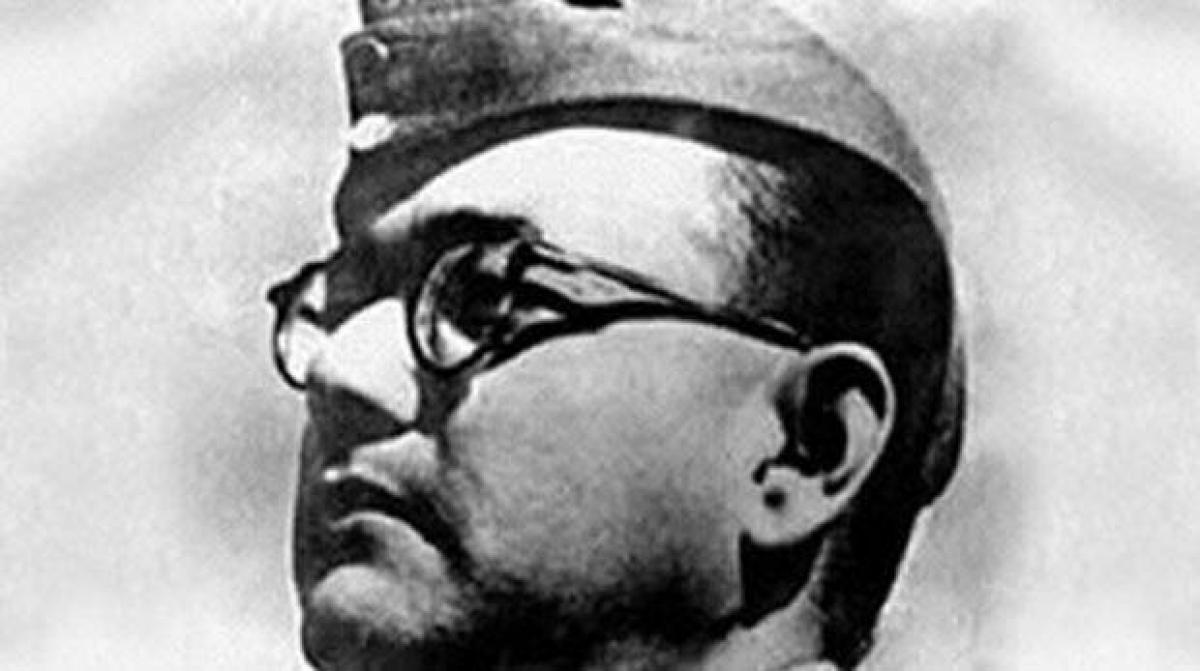Live
- Five-Year-Old Boy Dies After 55-Hour Rescue from Borewell in Rajasthan's Dausa
- Chaos in Parliament over Congress-George Soros link claims, BJP MP poses questions
- Bus Driver Arrested After Deadly Accident in Mumbai’s Kurla; 42 Injured
- Community lunch, a ritual to prevent drought in Adoni
- Rs 36.07 crore tribal products sold through TRIFED in FY24: Govt
- PM Modi to lay foundation stone for Ken-Betwa river linking project on Dec 25: MP CM
- 70 farmers trained as drone pilots in Anantapur dist
- AP Pensions: 500 Ineligible People Receive Pensions for Every 10,000
- South Korea's ruling party chief voices support for President Yoon's impeachment
- Defeat in Tirhut bypolls doesn't signify discontent among teachers: Bihar Education Minister
Just In

A British website, set up to catalogue the last days of Netaji Subhas Chandra Bose, has released what it claims are eyewitness accounts of the day he was reportedly killed in a plane crash in Taiwan on August 18, 1945.
A British website, set up to catalogue the last days of Netaji Subhas Chandra Bose, has released what it claims are eyewitness accounts of the day he was reportedly killed in a plane crash in Taiwan on August 18, 1945.
The latest set of documents quote several people who were reportedly involved in the matter related to the accident as well as two British intelligence reports that revisited the crash site to establish the facts.
The website also sheds light on what may have been the freedom fighter's dying words, which reflected his devotion to the cause of India's freedom.
"For 70 years, there have been doubts in certain circles whether such a tragedy at all took place. Four separate reports each corroborating the other constitute irresistible evidence to the contrary," says a statement issued by www.bosefiles.info.
The documents say that early in the morning on 18 August 1945, a Japanese Air Force bomber took off from Tourane in Vietnam with Bose and 12 or 13 other passengers and crew. Also on board was Lt Gen Tsunamasa Shidei of the Japanese Army and the planned flight path was Heito-Taipei-Dairen-Tokyo.
The three-member Netaji Inquiry Committee, instituted by the government of India in 1956 and headed by Major General Shah Nawaz Khan of Bose's Indian National Army (INA), was told that since "the weather was perfect and the engines (of the aircraft) worked smoothly" the pilot decided to overfly Heito and proceed straight to Taipei, arriving there late morning or early afternoon.
Major Taro Kono, a Japanese Air Staff Officer and one of the passengers, told the committee: "I noticed that the engine on the left side of the plane was not functioning properly. I, therefore, went inside the plane and after examining the engine inside, I found it to be working all right."
He added the accompanying engineer "also tested the engine and certified its air-worthiness". Captain Nakamura alias Yamamoto, the ground engineer in charge of maintenance at the airport, concurred with Major Kono "that the engine of the left side was defective".
He said the pilot told him "it was a brand new engine". He went on to say: "After slowing down the engine, he (the pilot) adjusted it for about five minutes. The engine was tested twice by Major Takizawa (the pilot). After being adjusted, I satisfied myself that the condition of the engine was all right. Major Takizawa also agreed with me that there was nothing wrong with the engine."
However, soon after the aircraft was airborne there was, according to Colonel Habib ur Rahman - Bose's ADC and a co-passenger, a loud explosion. He described it as "a noise like a cannon shot".
Nakamura, who was watching from the ground, said, "Immediately on taking off, the plane tilted to its left side and I saw something fall down from the plane, which I later found was the propeller."
The website also sheds light on what may have been the freedom fighter’s dying words.
“Jab Apney Mulk Wapis Jayen To Mulki Bhaiyon Ko Batana Ki Mein Akhri Dam Tak Mulk Ki Azadi Ke Liyay Larta Raha Hoon; Woh Jangi Azadi Ko Jari Rakhen. Hindustan Zaroor Azad Hoga, Oos Ko Koi Gulam Nahin Rakh Sakta. (When you go back to the country, tell the people that up to the last I have been fighting for the liberation of my country; they should continue to struggle, and I am sure India will be free before long. Nobody can keep India in bondage now.)” Netaji had said.

© 2024 Hyderabad Media House Limited/The Hans India. All rights reserved. Powered by hocalwire.com







